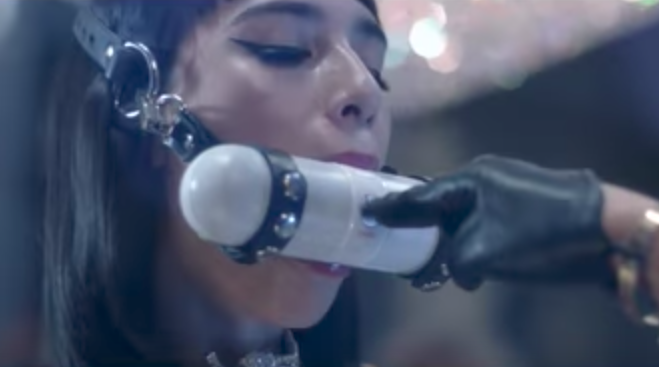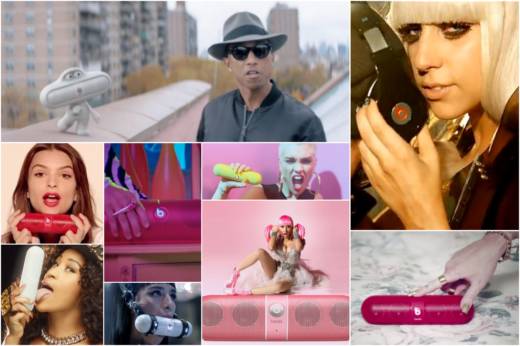In the post-album-buying age, artists have to make money in new and ever-expanding ways. In the '90s, back when people actually bought albums on the regular, going to a concert rarely cost more than $50, and T-shirts at the show were usually $10-$15. These days, as artists try to make up revenue they no longer get from record sales, concert tickets have skyrocketed in price, and merch can be positively extortionate. But there's another weird side effect that has changed the face of music.
It started in 2008 with an aggressive marketing strategy by Beats by Dre. Recent HBO documentary series, The Defiant Ones, talks openly about the fact that Dr. Dre's business partner, Jimmy Iovine, pushed the headphones on every single famous person he came into contact with -- be they athletes, actors, or musicians -- in order to market them to the public. That year, Beats by Dre headphones showed up in music videos by Lady Gaga, Ludacris, Pussycat Dolls, The Game, Snoop Dogg, Solange, Busta Rhymes & Linkin Park, Keri Hilson, and too many others to mention.
Not only was there nothing subtle about any of Beats by Dre's marketing, it opened the floodgates. By 2012, Swedish House Mafia's "Greyhound" video transformed into an Absolut Vodka commercial, Ellie Goulding's "How Long Will I Love You" was one long, excruciating Nokia endorsement, and No Doubt's "Settle Down" was a thinly veiled ad for Ice watches. The following year, Avicii's "Wake Me Up" video was basically a Ralph Lauren brochure, and Jennifer Lopez and Pitbull demonstrated what great multi-taskers they were by advertising Nokia phones, Swarovski jewelry, Beluga vodka, and Ice watches all in the space of one video ("Live it Up" should probably be renamed "Buy More Stuff").
It was the arrival of the Beats Pill speaker though, that took music-videos-as-commercials to the next level. The prior marketing of Beats by Dre headphones looked positively subtle by comparison. Between 2013 and 2015, it was hard to find a music video that didn't spend an annoyingly long time lingering on a Beats Pill. Ariana Grande, Nicki Minaj, Chris Brown, Robin Thicke, TI and Pharrell, Coldplay, Jessie J, Ty Dolla $ign, Lily Allen, and more prominently featured the product in their videos. In the "We Can't Stop" video, we see the pill before we even see Miley Cyrus's face, and in Britney Spears' "Work Bitch," the pill is even used as a ball gag.

Post-Beats Pill, all bets are off; some artists are shilling a wide variety of products (and now services!) in their music videos in a manner that can only be described as shameless.


